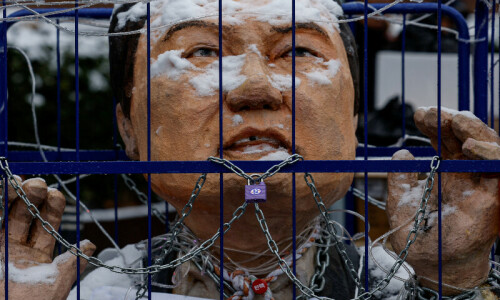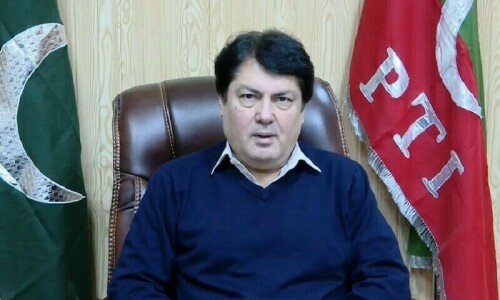The International Monetary Fund’s (IMF) first review of the reforms programme scheduled for December will be preceded by a visit of a senior Fund official this month, followed by a technical team, to Islamabad to oversee the results achieved so far by Pakistan.
Under the agreement, the authorities are required to promptly let the IMF know of any data revisions and other information necessary to monitor the arrangements. This indicates that the Fund’s staff was aware that containing the twin deficits – fiscal and current account – was a very challenging job for Pakistan, which was the primary focus of the macro-economic stability agenda.
The economy suffered from deep-seated structural crises and the government was constrained by tough ground realities. The new government’s competence was not enough to deliver. Pakistan’s past record in implementing the IMF reforms, to say the least, was also not envious.
Given this background, the PTI-government thought it wise to put in place a finance team which would enjoy the confidence of the Fund to execute the programme. For all practical purposes, the reforms are being pursued by this team and members co-opted by it.
The performance of the economy should be judged based on per capita income and not on the growth rate
The leading team members have made strenuous efforts to carry out prior IMF conditions to qualify for the Fund’s credit faculty and later to implement the agreement while facing strong opposition by a significant segment of the business community. It is this team that would primarily be answerable to the visiting IMF officials due this month.
A leading team member and the State Bank of Pakistan Governor Dr Reza Baqir says ‘the economy is gradually improving’. His optimism is based essentially on the sharp reduction in the current account deficit that is very close to the IMF target. However, looking at the level of foreign exchange reserves he asserts that ‘it is too early to declare victory.’
In the sphere of the external sector, some analysts see one of the major threats to exports coming from the looming de-industrialisation. The draft policy to promote trade-related industrial investment for import-substitution and export-promotion, which over time could bridge trade deficit to manageable levels on a durable basis, has been put on the back burner.
The Finance Ministry says the IMF Middle East and Central Asia Director Jihad Azour, due this month in Islamabad, will be apprised of the ‘results’ achieved so far.
And the ministry official reiterated that ‘the targets under the IMF programme are ambitious, and there is no need to renegotiate’ the IMF deal. Implicit in the statement is that Fund would look at the efforts and direction of things rather than judge the performance on meeting its benchmarks. It may be recalled that the last PML-N government received liberal waivers from the IMF.
The official was responding to media speculations about the possible renegotiations of the IMF deal and need for a mini-budget following the release of the latest data showing primary fiscal deficit shooting up to 3.6 per cent during 2018-19 from the earlier official estimate of 1.8pc. The fiscal target was to be reduced to 0.6pc this fiscal year.
While the tax revenues are trailing behind targets, non-development spending, particularly debt-servicing and defence, has surged beyond expectations. The rupee cost of foreign debt accounts for 39pc of the total public debt owing to the rupee depreciation as insisted by the Fund.
Similarly, the policy rate hike also increased the expense of the government’s domestic debt servicing. And in the absence of any serious austerity plan, the fiscal deficit saw a further deterioration. Much against the general expectation and as provided in this year’s budget, the spending on the two major items, a drain on the government’s resources, will continue unabated.
On the income side, though revenues from taxes and custom duties have risen by 14.6pc to Rs579.6 billion during July and August against comparable months last year, the collection is Rs64bn short of the target. The last year’s collection was Rs3.8 trillion and this year’s target is Rs5.5tr. A knowledgeable tax expert says this year is likely to end up with a collection of about Rs4tr.
On the expenditure side, the mountains of debts, which are supposed to provide ‘leverage’ are dragging down social and economic progress. The axe is falling on development spending. In the first two months, only Rs70bn has been released from the stipulated allocation of Rs710bn for the annual Public Sector Development Programme.
Similarly, the investment by the private sector is also subdued. The State Bank’s data shows that the private sector borrowing during July and August was negative Rs84.6bn against a net borrowing of Rs39bn during the same period a year ago.
Industries, especially the manufacturing sector, are operating much below their installed capacity. This, coupled with the taxation policy, has affected adversely the growth of the services sector. The slack in overall business activity is beginning to show early signs of a contagion effect on the financial markets.
The Financial Stability Review (FSR) for the calendar year 2018 issued by the central bank says “the monetary tightening may affect the debt repayment capacity of the borrowers with some lag.” In fact, debt quality has already been affected. Amid rising macroeconomic challenges, risks to financial stability had somewhat increased during 2018.
Pakistan’s moderate economic strength, robust growth potential and large-scale economy is limited, among other adverse factors, by a very low per capita income, says the credit rating agency Moody’s.
A recent study by central bank experts suggested that the performance of the economy should be judged based on per capita income and not on the growth rate. According to Standard and Poor’s forecast, per capita GDP will fall just above $1,200 by the end of the current year versus $1,565 in 2017-18 owing to 25pc exchange rate loss. It means that the falling domestic demand will delay economic recovery.
Looking at the key macroeconomic indicators, “the situation points to a classical form of an evolving recession”, says former Finance Secretary Waqar Masood Khan. Islamabad and the IMF jointly need to prevent such an eventuality.
Published in Dawn, The Business and Finance Weekly, September 16th, 2019














































Dear visitor, the comments section is undergoing an overhaul and will return soon.